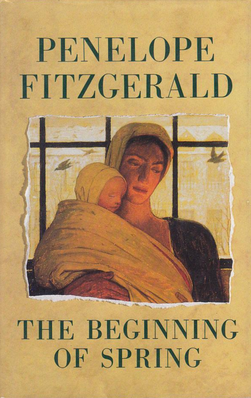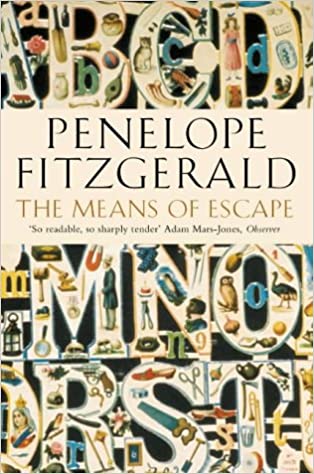After reading The Gate of Angels, I developed an appetite for more Fitzgerald, so I conitnued with another historical novel The Beginning of Spring (set in Moscow in 1913) and her collection of short stories The Means of Escape, many of which are set in exotic locations and in the 19th century.
The Beginning of Spring sees Russia on the verge of war and revolution, but of course no one knows that yet. Moreover, this is all seen through the eyes of the expat community. Frank Reid might have been born and bred in Russia, and inherited his father’s business in Moscow (of which only the printing side of things is still viable), but he is still regarded as an Englishman.
He had a reputation for doing what he could… but all of them, at one point or another, reminded him that he was a foreigner wghim even if things didn’t go right, had nothing to lose.
He met his future wife Nellie when he went to England to study and work for a few years, and then spent three years in Germany, where their two eldest children were born. So they are a real expat family, their children equally comfortable conversing in Russian and in English.
I could really relate to Frank’s love for his adopted country, that tension of belonging and yet remaining an outsider. But above all, I loved Fitzgerald’s ability to encompass a whole place and time with just one sentence.
Frank’s affection for Moscow came over him at odd and inappropriate times and in undistinguished places. Dear, slovenly, mother Moscow, bemused with the bells of its four times forty churches, indifferently sheltering factories, whore-houses and golden domes, impeded by Greeks and Persians and bewildered villagers and seminarists straying on to the tramlines, centred on its holy citadel but reaching outwards with a frowsty leap across the boulevards to the circle of workers’ dormitories and railheads, where the monasteries still prayed, and at last to a circle of pig-sties, cabbage-patches, earth roads, earth closets, where Moscow sank back, seemingly with relief, into a village.
When the book opens, Frank’s wife has just left him and their three children without a warning or a satisfactory explanation. Mild-mannered and indecisive Frank sort of expects her to come back, but is finally convinced that he needs to find a childcare solution and hires a young salesgirl Lisa. The children soon grow very fond of her, and Frank finds himself attracted by her quiet, mysterious ways. Soon, everyone he knows is winking and nudging and hinting quite broadly that there is a relationship between Frank and the nanny. Frank spends most of the book trying to dispel that idea, although he would like nothing more than to have a relationship with her. Mrs Graham, the chaplain’s wife, makes no bones about it and her exchange with the hapless Frank is a masterpiece of understated comic timing:
‘Of course he thinks quite highly of her!…Show me a single man who wouldn’t! Quiet, blonde, slow-witted, nubile, docile, doesn’t speak English, hardly speaks at all in fact, sloping shoulders, half-shut eyes, hasn’t broadened out yet though I daresay she will, proper humility, reasonable manners, learned I suppose behind the counter at Muirka’s.’
‘I don’t think her eyes are usually half-shut,’ said Frank.
‘You’re all of you serf-owners at heart! Yes, this brother-in-law too! Fifty years after Emancipation, and you’re still chasing them into the straw-stacks!’
‘Don’t let yourself be carried away, Mrs Graham,’ said Frank. ‘They’ve never had serfs in Norbury.’
Frank is an occasionally infuriatingly passive creation but extremely relatable: ‘lukewarm, but not quite cold, unbelieving, but not quite disbelieving, he had fallen into the habit of not asking himself what he thought.’ The books is essentially about the next few months of his life, with some dramas and much bewilderment. His brother-in-law pays him a visit, the children go to their countryside dacha, he muddles around with his accountant who is a poet and a Tolstoy acolyte but not very good with figures. The ending is, just like in The Gate of Angels, a bit of a bombshell, far too abrupt and leaving matters wide open.
Yet in The Means of Escape, Fitzgerald shows she can craft as conclusive and satisfying an ending as anyone. Not all of the stories have it – some seem to peter out and you wonder if you’ve missed something. And even in the ones with a satisfying ending, there always remains a little flourish of surprise, something that makes us want to smile or frown and rush to read the story once again. Her sense of setting, of course, remains impeccable: a stifling rectory in Hobart, Tasmania; a manor house judged of insufficient interest to be taken up by the National Trust and shunned by visitors; painters decamping to Brittany, determined to paint outdoors, only to be defeated by the constant rain; a remote farmstead in New Zealand; the Greek district of Phanar/Fener in Istanbul. She tackles the expat community once more: this time Americans in Mexico in ‘Our Lives Are Only Lent to Us’, who fail to truly understand the concerns of their servants and their families even after decades of living there.
My personal favourite (as a former HR professional) is perhaps ‘The Axe’, one of her first published stories, where a managing director of a small firm writes a report to the CEO of the parent organisation, after having been asked to make redundancies. His particular concern is his clerical assistant Singlebury, who had been an exemplary worker for many years, but was now growing old. ‘Getting old is, of course, a crime of which we grow more guilty every day.’ Work seems to be his whole life, dismissal would be worse than death to him, as one of the other employees observes. I’m not going to give you a blow by blow account of this quite short story, but let’s just say that not a single word is wasted and one masterpiece of a sentence follows another. Quite brilliant, and also quite chilling, with shades of Edgar Allan Poe.
The book was published shortly after her death and gathered stories written throughout her career, so there is quite a variety stylistically and thematically. What I did find consistent was her ability to create ‘quiet explosions’ in her characters’ lives, and to observe the lives of the small, marginalised, vulnerable and typically unheard people. Some of the stories verge on the Gothic and have disquieting little twists, but then, there is always a fascination with the supernatural in most of Fitzgerald’s work (remember the ghost story in The Gate of Angels?). Others offer a direct insight into the very depths of someone’s soul, something they are hiding even from themselves.
Penelope Fitzgerald, to me, is the quintessentially English writer that meant so much to me in those dark days of trying to sneak into the forbidden British Council library. Mature, witty, able to be both detached and empathetic, she mines that rich vein that Jane Austen, Barbara Pym, Muriel Spark and so many other fantastic English writers made their own, representing all the calm and reassurance of a centuries-old literary tradition and a settled democracy to which I secretly aspired. It was these polished, perfect sentences and elliptical approach to serious themes (rather than Downton Abbey gossip or Merchant/Ivory film costumes) that I expected to find when I moved to the UK. Of course it was reductionist, and I have found both much more (but also, somehow, less). Nevertheless, it is delightful to reconnect with what drew me to this country in the first place.


I love that quote about Frank’s affection for Moscow – I have never read any Penelope Fitzgerald but it seems like this might be a good place for me to start.
It really is: I like her historical work better than her contemporary stuff, but her wit is evident in all her work.
My goodness. You’ve really encouraged me to re-visit Penelope FitzGerald. But that TBR list ….
Love The Beginning of Spring. As you say, Fitzgerald’s evocation of early 20th-centuty Russia is amazing, particularly considering that the book was written without the benefit of any first-hand experience of the country…
So interesting! I must admit I didn’t gel with The Beginning of Spring at all, which may be an issue with me and my ideas of Russia! I think I will have to try her again with a different book!
It was an outsider’s view of Russia, most definitely, but that was the point, I think. And it steered clear of caricature – although that bear cub anecdote did skirt dangerously close to it!
Another from the trilogy of her novels I read in the Everyman collection. What’s so striking about them is their variety: she never seems to repeat herself. That is a knockout quotation about Moscow – she might never have been there, and it might not be accurate, but it’s…pungent.
She manages to encapsulate so much, an entire world, in just a few sentences. I really admire her economy of style!
I really like the way you describe feelings about an adopted country, Marina Sofia – loving it, but never quite feeling that sense of belonging. That’s not an easy tension to describe. You’ve reminded me how naughty I’ve been not reading Fitzgerald’s work, although I know about it. Now going to stand in the corner…
What an outlet writing these stories must been for Fitzgerald. She would have needed to have some fun with the stories and observations, and certainly had the skill for it. Lovely reviewing. Thank you…
I haven’t read either of these Fitzgerald books, The Beginning of Spring does sound excellent and I am sure I would like her short stories.
She is such a strange (but successful, on the whole) combination of the resolutely mundane and well-observed, and the sudden flights of imagination.
I’ve only read her book The Book Shop, but it didn’t age really well. I’ll check these out.